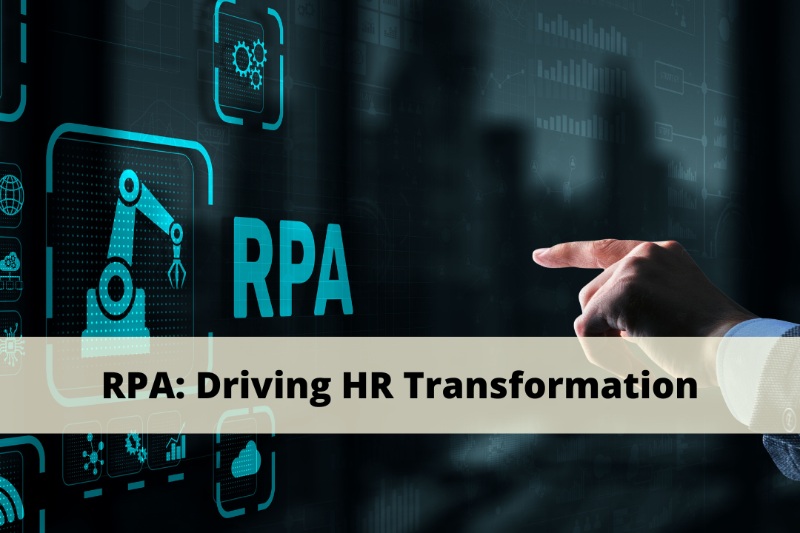RPA is the foundation of Digital Transformation that can optimize operational efficiencies & increase productivity, while delivering cost savings and service improvements
by Sriram Iyer, CEO, hrtech

As part of IHRP’s HRTech Taskforce, our key focus has been to enable the Singapore HR community adopt a Digital mindset and future-proof them by making them HRTech-ready. Harnessing these technologies can enable HR transformation. HR teams can become more efficient as technology frees up their time for strategic value-add activities that help their organisations transform and grow.
As part of the 4-part IHRP’s Tech Talk Series, the first webinar showcased how Robotic Process Automation (RPA) can play a key role for HR teams that are looking to lay a strong foundation for a new digital workplace and workforce.
For those who missed the webinar, here’s a quick event summary:
WHAT IS RPA?
Robotic Process Automation (RPA) is the foundation of Digital Transformation that can optimize operational efficiencies and increase productivity, while delivering cost savings and service improvements across countless HR processes. Over the past few years, RPA in HR has moved from a fringe application to wider adoption.
Fig.1 – Journey to Intelligent Automation. Source: SimpilfyNext
RPA has found its use in HR to automate monotonous, repetitive and time-consuming processes in -
- Recruitment (downloading of resumes from multiple portals onto a common folder)Auditing Datasets, Benefit Administration (such as Leave Claim Administration, Health Plan Enrolment, Filing of Employee Bonus Schemes)
- Employee Onboarding & Shared Services processes (such as filing of employee documents)
- Policy Issuance & signatures.
The list can be extended across all HR processes, from recruitment to retirement.
Irrespective of the industry and back end legacy systems, the session explored how automation in HR and Operations can be applied across all industries and lines of HR business. The slide above shared by SimplifyNext also shows the various RPA service providers in the Singapore market.
BENEFITS OF RPA?
With the extensive exposure to RPA — HR implementation for clients in Singapore, Jason Ku of Simplify Next shared a quick summary of the immense benefits of intelligent automation.
Fig.2 – RPA Benefits. Source: Jason Ku, Simplify Next
Connie Poshala of Blue Prism shared this self-explanatory ‘Before & After Automation’ slide that shows how HR teams can benefit from Analysis & Insights which were earlier sorely missed.
Fig.3 – Before & After Automation. Source: Connie Poshala, Blue Prism
STEPS FOR A SUCCESSFUL AUTOMATION JOURNEY
Based on SimplifyNext’s journey working with multiple clients, Jason Ku shared some notable insights on how to successfully carry out digital transformation through automation in HR.
- Understand the journey itself and plan ahead. What is the problem you are trying to solve, what are the expected end goals and what is the timeline to achieve the implementation? These will help plan the HR automation journey and find the right people and skills required to be successful in the automation journey
- Capability development (identify, train or hire) within the organisation to institutionalise the automation journey.
- Partnership within IT and HR for bridging the gap and ensuring business goals and objectives are met in a sustainable manner.
As shared by Vincent Tan, based on ComfortDelgro’s RPA journey, the outcome of a well-executed RPA implementation is truly a win-win!
3-Step Approach
Fig.4 – Outcome of a well-executed RPA implementation. Source: Vincent Tan, based on ComfortDelgro’s RPA journey
CONCLUSION
The HR teams are also under pressure to deliver more with less. There is a strong nudge from the Singapore government to adopt a technology-enabled, productivity-focused approach; and a stronger push from leadership teams for data-driven decision making to ensure ROI for every dollar spent.
RPA in HR can be the first step for all such progressive transformations!
ADDITIONAL SOURCES
Watch the Webinar
References:
- Fig.1 – Journey to Intelligent Automation. Source: Simpilfynext
https://www.simplifynext.com/ - Fig.2 – RPA Benefits. Source: Jason Ku, Simplify Next
https://www.linkedin.com/in/jason-ku-2884a970/ - Fig.3 – Before & After Automation. Source: Connie Poshala, Blue Prism
https://www.linkedin.com/in/connieliu/
https://www.blueprism.com/ - Fig.4 – Outcome of a well-executed RPA implementation. Source: Vincent Tan, based on ComfortDelgro’s RPA journey
https://www.linkedin.com/in/vincent-tan-ihrp-sp-23b74b56/
https://www.comfortdelgro.com/
About the author :

Sriram Iyer is the founder & CEO of hrtech, a Singapore- headquartered #hrtech market development and analyst firm. A Human Resources practitioner with over two decades of experience, he is also a Certified Strengths Coach and a passionate #hrtech advocate. In his career, he has played leadership roles with the Singtel Group Enterprise and Nasdaq-listed Cognizant Technology Solutions. LinkedIn
About the company :
Founded in 2018, we are a Singapore-based HRTech Analyst firm dedicated to facilitating Workplace and Workforce Transformations that drive impactful Business and HR outcomes. Our ultimate vision is to empower HR professionals to transform their organizations by seamlessly integrating technology and human-centric approaches.
From our very beginning, we have been committed to building a TECH-DRIVEN and DATA-CENTRIC HR ECOSYSTEM that empowers organizations to achieve successful Workplace and Talent Transformations, while enabling HR teams to evolve into Strategic Business Partners.
At hrtech, we recognize the paramount importance of adapting to the ever-changing demands of the modern workplace. Our unique value proposition lies in automating and digitizing HR processes to initiate a transformative mindset shift. By embracing our ecosystem, organizations can leverage the power of technology to streamline operations, enhance Business and HR productivity and efficiency, elevate employee experiences, and unlock their full potential.
Our comprehensive ecosystem serves as a catalyst for the digital transformation of HR functions, enabling you to optimize efficiency, foster innovation, and cultivate a thriving workforce amidst constant change. To facilitate this transformation and drive organizational success, we operate through our four distinct verticals of Academy, Advisory & Consulting, Marketplace Solutions and Talent OnDemand.

